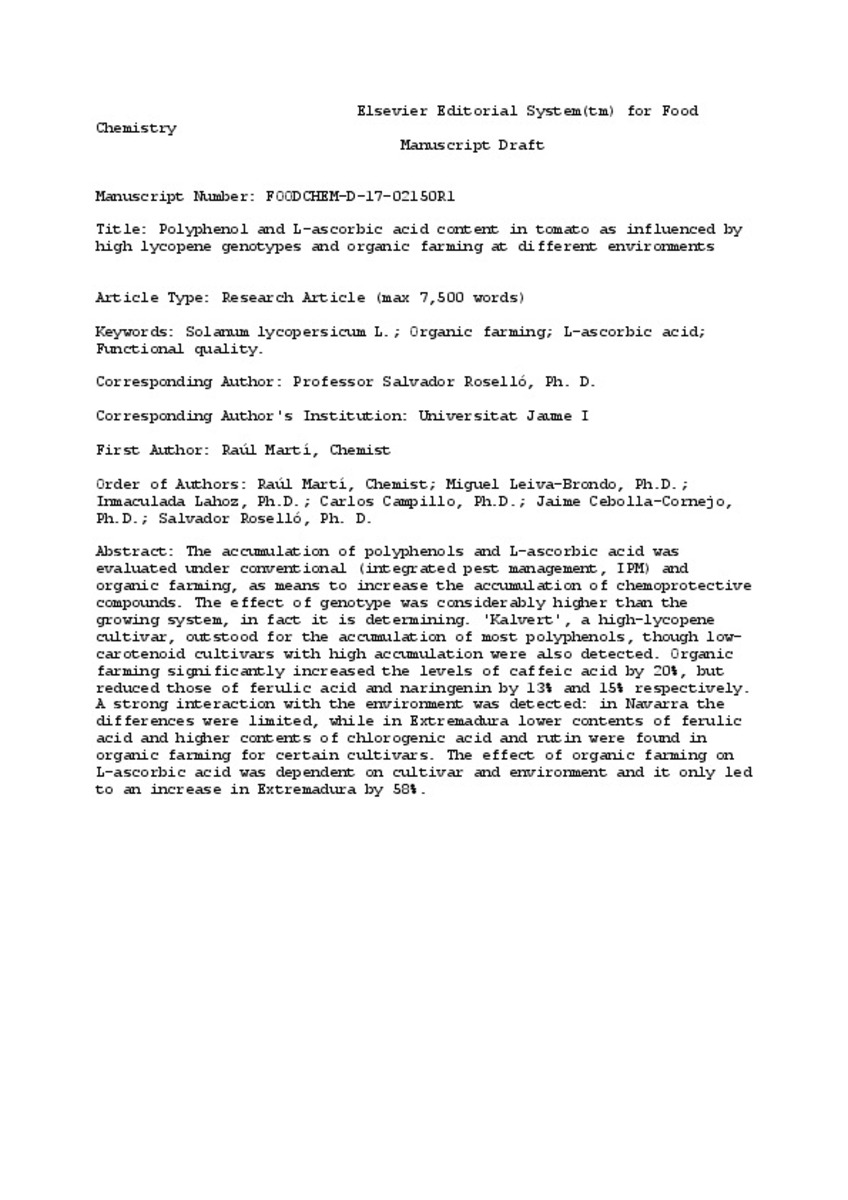Mostra el registre parcial de l'element
Polyphenol and l-ascorbic acid content in tomato as influenced by high lycopene genotypes and organic farming at different environments
| dc.contributor.author | Martí, Raúl | |
| dc.contributor.author | Leiva-Brondo, Miguel | |
| dc.contributor.author | Lahoz García, Inmaculada | |
| dc.contributor.author | Campillo, Carlos | |
| dc.contributor.author | Cebolla-Cornejo, Jaime | |
| dc.contributor.author | Roselló, Salvador | |
| dc.date.accessioned | 2018-03-21T09:59:34Z | |
| dc.date.available | 2018-03-21T09:59:34Z | |
| dc.date.issued | 2018-01-15 | |
| dc.identifier.citation | MARTÍ RENAU, Raúl; LEIVA-BRONDO, Miguel; LAHOZ, Inmaculada; CAMPILLO, Carlos; CEBOLLA CORNEJO, Jaime; ROSELLÓ RIPOLLÉS, Salvador. Polyphenol and l-ascorbic acid content in tomato as influenced by high lycopene genotypes and organic farming at different environments. Food Chemistry (2018) v. 239, p. 148-156 | ca_CA |
| dc.identifier.uri | http://hdl.handle.net/10234/173519 | |
| dc.description.abstract | The accumulation of polyphenols and L - ascorbic acid was evaluated under conventional (integrated pest management, IPM) and organic farming, as means to increase the accumulation of chemoprotective compounds. The effect of genotype was considerably higher than the growing system, in fact it is determining. 'Kalvert', a high - lycopene cultivar, outstood for the accumulation of most polyphenols, though low - carotenoid cultivars with high accumulation were also detected . Organic farming significantly increased the levels of caffeic acid by 20%, but reduced those of ferulic acid and naringenin by 13% and 15% respectively. A strong interaction with the environment was detected: in Navarra the differences were limited, whil e in Extremadura lower contents of ferulic acid and higher contents of chlorogenic acid and rutin were found in organic farming for certain cultivars. The effect of organic farming on L - ascorbic acid was dependent on cultivar and environment and it only le d to an increase in Extremadura by 58%. | ca_CA |
| dc.format.extent | 35 p. | ca_CA |
| dc.format.mimetype | application/pdf | ca_CA |
| dc.language.iso | eng | ca_CA |
| dc.publisher | Elsevier | ca_CA |
| dc.relation.isPartOf | Food Chemistry (2018), v. 239 | ca_CA |
| dc.rights.uri | http://rightsstatements.org/vocab/CNE/1.0/ | * |
| dc.subject | Solanum lycopersicum L. | ca_CA |
| dc.subject | Organic farming | ca_CA |
| dc.subject | l-Ascorbic acid | ca_CA |
| dc.subject | Functional quality | ca_CA |
| dc.title | Polyphenol and l-ascorbic acid content in tomato as influenced by high lycopene genotypes and organic farming at different environments | ca_CA |
| dc.type | info:eu-repo/semantics/article | ca_CA |
| dc.identifier.doi | https://doi.org/10.1016/j.foodchem.2017.06.102 | |
| dc.relation.projectID | This research was partly funded by INIA (RTA2011 - 00062, Spain) and FEDER (EU) | ca_CA |
| dc.rights.accessRights | info:eu-repo/semantics/openAccess | ca_CA |
| dc.relation.publisherVersion | https://www.sciencedirect.com/science/article/pii/S0308814617310853 | ca_CA |
| dc.type.version | info:eu-repo/semantics/publishedVersion | ca_CA |
Fitxers en aquest element
Aquest element apareix en la col·lecció o col·leccions següent(s)
-
CAMN_Articles [566]







